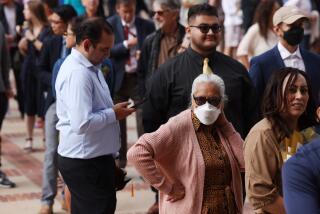Public’s Ignorance on AIDS Hampers Care, Doctors Say
- Share via
The public’s tendency to think of AIDS as a disease that strikes only homosexuals is blocking the kind of community-based effort needed for the proper handling of such cases in Los Angeles, county health physicians said Wednesday.
While AIDS--acquired immune deficiency syndrome--has struck predominantly among homosexuals or bisexuals, “the virus that is responsible for the disease does not know the difference between gay and straight,” Dr. Peter Heseltine, chief of epidemiology at County-USC Medical Center, told an audience of Latino health workers at White Memorial Medical Center in the eastern part of Los Angeles.
“AIDS can be acquired by a heterosexual just as easily as by a homosexual,” he said. “Other people think they don’t need to be concerned--but they do.”
According to Dr. Martin Finn, public health medical director for the county Department of Health Services, 805 cases of AIDS were reported in Los Angeles County through March.
Walking a ‘Narrow Line’
Finn said that public health officials must “walk a very narrow line.”
“We don’t want to panic the public, but we want the public to see the significance of the issues,” the physician said. “AIDS is in this hospital, this area of Los Angeles, this community. It (AIDS) is our No. 1 public health problem.”
By emphasizing that the disease exists in predominantly Latino Eastside neighborhoods, Finn was attempting to draw the audience’s attention to the fact that AIDS cases are not confined to heavily populated gay areas of the county, such as Hollywood-Wilshire, and that Latinos are among those who acquire it.
Nationwide, 15% of the more than 9,000 cases reported to date have been among Latinos. New York and California, the states with the largest Latino populations, also have the greatest number of cases of AIDS.
Brazil, Heseltine said, has the largest number of cases outside the United States, and cases have also been reported in Argentina, Chile, Colombia and the countries of Central America. He said that some of the cases now being treated at County-USC probably were acquired in Latin America.
According to Heseltine, who grew up in Latin America, a tendency by Latinos to deny that homosexuality exists among them is causing an extra burden for those Latinos who develop AIDS.
He said that many Latino patients arrive at the hospital in an advanced state of the disease because of fear of being confronted with the social stigma of homosexuality. He told of letters written by patients to their families that were returned to the hospital unopened.
He said the families probably returned the letters out of ignorance and an exaggerated notion of the risk to them of being associated with an AIDS patient.
Heseltine emphasized that the virus responsible for AIDS cannot be spread through the air, as is the case with influenza germs, and that probably it cannot be acquired simply by living in the same house with a patient.
Glen Kennedy, associate director of AIDS Project-Los Angeles, a nonprofit organization that helps AIDS patients deal with the anxiety, fear and guilt that accompany the disease, said that “there is a great need to fight the ignorance and prejudice” that is still widespread throughout the community.
Kennedy alluded to reports that mail carriers in some places refused to deliver letters to homes of AIDS patients. “That’s the kind of ignorance we are talking about,” he said.
AIDS patients, he said, have a great deal of trouble getting dental care because of “prejudice, fear and misconceptions of how it is transmitted and fear (by dentists) that other patients will find out that he treats AIDS patients.”
After the meeting, Heseltine told a reporter that occasionally morticians had caused problems by declining to accept AIDS patients or by not wanting to embalm them.
Earlier, he said that County-USC had 140 admissions for AIDS in 1984. Between 11 and 15 new patients a month are now being seen, he said, with their average three-week hospital stay being three times the normal stay for such problems as heart attacks or pneumonia.
“AIDS is phenomenally costly,” Heseltine said. “Although they are less than 1% of all patients, they consume about 5% of all hospital days. . . . This treads on sensitive issues, so we need the involvement of the community, not just medicine.”
More to Read
Sign up for Essential California
The most important California stories and recommendations in your inbox every morning.
You may occasionally receive promotional content from the Los Angeles Times.













